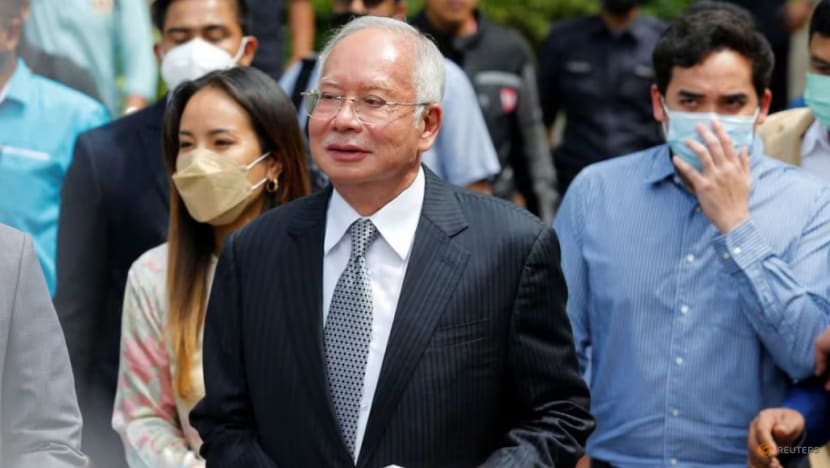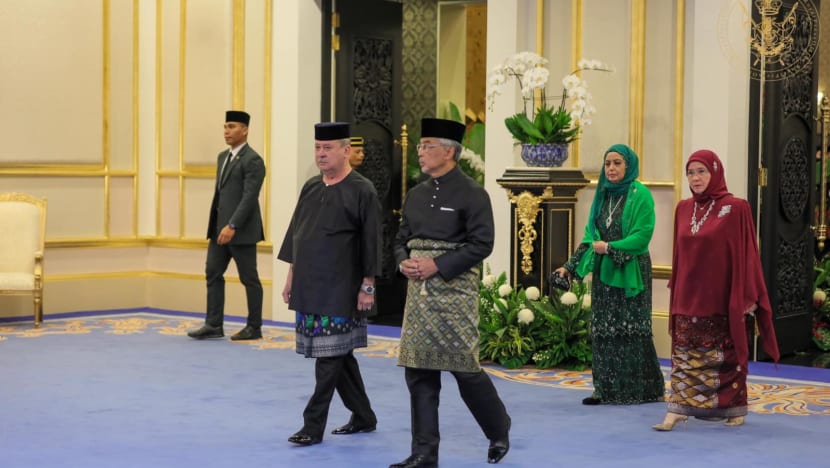Malaysia’s Pardons Board halves Najib’s jail term to 6 years: How it happened, and what questions remain
Sources explain how former prime minister Najib Razak got his application heard, how the Pardons Board’s sentiments changed, and questions that linger over parole and the large discount off his fine.


This audio is generated by an AI tool.
KUALA LUMPUR: Malaysia's Pardons Board has announced that former prime minister Najib Razak's jail sentence for corruption has been reduced from 12 to six years.
The official announcement on Friday (Feb 2) comes after the Pardons Board met on Jan 29.
CNA was the first to break the news on Jan 31, citing sources including senior government officials, that Najib would have his jail term halved and fine reduced under a partial royal pardon.
Najib, 70, has served less than two years of his prison term for his role in the 1Malaysia Development Berhad (1MDB) case.
With the reduction in the jail term, Najib has agreed that he will be released on Aug 23, 2028, the statement said.
The Pardons Board also reduced his RM210 million (US$44.5 million) fine to RM50 million.
But if the fine is not paid, one year will be added to Najib's prison sentence and he will be released on Aug 23, 2029, the Board added.
Speculation about a potential pardon went into overdrive after Dr Zaliha Mustafa, Minister in the Prime Minister's Department (Federal Territories), confirmed on Tuesday that the board had met on Monday.
The meeting was one of Sultan Abdullah Ri’ayatuddin’s last official tasks before he stepped down as Malaysia’s king on Jan 31 and handed the role to Johor ruler Sultan Ibrahim Sultan Iskandar under the country’s unique rotation system for its nine royal state households.
Najib was Malaysia’s prime minister for nine years until May 2018 and its first PM to be imprisoned. He began serving his jail term in August 2022 after two failed appeals to overturn his conviction at a Malaysian High Court two years earlier.
The charges involved the transfer of RM42 million from SRC International, a former subsidiary of 1MDB, into his personal bank accounts in 2014 and 2015.
He was found guilty of three counts of criminal breach of trust, three counts of money laundering and one count of abuse of power by the High Court in July 2020, and was sentenced to 12 years in jail and fined RM210 million. The fine remains unsettled.
He is also facing several other charges in relation to the 1MDB scandal, including the laundering of RM27 million involving funds from SRC International.
Najib’s lawyers have applied to dismiss this money laundering case, and the court has said he can apply for an acquittal, or a discharge not amounting to an acquittal if prosecutors are not prepared to proceed with the trial in September, local media reported.
An ex-United Malays National Organisation (UMNO) president, he is still believed to wield huge influence in the party, which is part of Prime Minister Anwar Ibrahim’s unity government.
NUMEROUS TWISTS
Najib’s path to a pardon and clemency has been filled with twists.
Just days after he began serving his sentence at the Federal Prison of Kajang in the outskirts of the capital Kuala Lumpur, Najib filed an application for a royal pardon.
At the time, public opinion towards him was hugely adverse, except for certain factions in UMNO.
While the awarding of a pardon or any consideration of clemency is the sole prerogative of the king, administration sources noted that sensitive matters of huge national importance are typically discussed in private by the Conference of Rulers, which counts the nine heads of the country’s royal households.
At the time, the Conference of Rulers was cognisant that any hurried consideration of a pardon for Najib, who is still facing other corruption charges in separate cases involving 1MDB, could potentially trigger concerns over the country’s judicial system and adversely impact investor confidence in the country, lawyers close to the country’s royal households told CNA.
There was also the question about time served before a convicted person could be considered eligible to go before the Pardons Board.
While there are no hard and fast rules on what constitutes the minimum time served, senior criminal lawyers, who spoke on condition of anonymity, noted that traditional legal guidelines suggest a minimum of two years in jail would be considered acceptable for convictions under serious corruption charges.
As previously reported by CNA, a fresh clemency application from Najib’s legal team led by Mr Shafee Abdullah was filed in early December, and the matter was heard in the panel’s last meeting in the final weeks of 2023.
“WE JUST DODGED A BULLET”
At that session, sentiment among certain members of the board had somewhat softened in favour of the jailed premier, said senior administration officials familiar with the situation.
The Pardons Board then decided to defer the matter to the January session before Sultan Abdullah handed the reins over to Sultan Iskandar.

On Monday (Jan 29), shortly after the Pardons Board concluded its meeting, speculation swirled that Najib had received a full pardon.
Two local news organisations reported that the former premier had been granted a full pardon, sowing further confusion and stirring strong responses from ordinary Malaysians against Mr Anwar’s government on numerous social media platforms. The reports were subsequently retracted.
On Wednesday (Jan 31), upon receiving information from official sources, CNA broke the news that Najib’s prison sentence had been halved and the fine of RM210 million had been reduced to an unspecified amount.
A senior source in Mr Anwar’s inner circle acknowledged the premier had been aware of the decision shortly after the meeting ended on Monday.
“All he told us was that ‘we just dodged a bullet’ and we could only guess what he was referring to,” noted one person who was briefed about the episode.
QUESTIONS REMAIN OVER LARGE DISCOUNT OFF FINE, PAROLE
The Pardons Board’s official statement, however, has raised some new questions.
It noted that Najib’s RM210 million fine - like his prison sentence - would be halved, but put the new penalty at RM50 million, which is a discount of over 75 per cent.
The Prime Minister's Department (Law and Institutional Reforms) later issued a statement to clarify that the new penalties are accurate, without addressing why the error in the language was made in the first place.
Sunway University political scientist Wong Chin Huat said it could have been a typographical error.
“My first reading is that it was probably poor writing - that the 50 per cent (reduction) was meant to cover only the jail term. It would be interesting if this reveals fingerprints of negotiations, but I won't speculate,” he told CNA.
The Board’s statement made no mention of parole for good behaviour that would allow Najib to get out even earlier than the new release date.
Nusantara Academy for Strategic Research senior fellow Azmi Hassan believes the Board omitted this to avoid overstepping the authority of new king Sultan Ibrahim Sultan Iskandar, who would have to appoint members of the parole board.
“I think that's the reason why parole was never mentioned, but there is a possibility for (Najib to be released earlier on) good behaviour,” he said.
Also absent from the statement were the Board’s reasons for its decision.
While it is not legally required to disclose how it arrived at this outcome, politicians, lawyers and civil society have called for the grounds to be made public.
“Transparency is required politically, even though not legally. If the public cannot be convinced that Najib is a new man deserving a second chance, opaqueness will only amplify the public anger,” Dr Wong said.
Speaking to news outlet Al Jazeera after the Pardons Board released its statement, Mr Anwar said Najib’s ongoing court cases have to continue through an independent judicial process.
At the same time, Najib has the right to appeal to the new king if he is not satisfied with the outcome of his pardon application, Mr Anwar said.
“The process has to be respected, it’s beyond the prime minister or the government. I respect the decision of the then-king. Now, we have a new king,” he said.
“So whatever one feels - of course it’s very political; some support, some don’t - they cannot ignore the fact that you must respect the right of anyone convicted to appeal to the Pardons Board.”




















